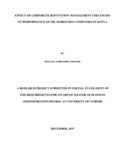| dc.description.abstract | In the 21century, businesses operate in complicated and dynamic conditions controlled by several elements including globalization, recurrent undetermined reform, ever increasing usage of machinery and scientific know how. Most managers are pre-occupied with the responsibility of successfully attaining the desired performance in the current competitive environment with slow economic growth rate. Intellects and philosophers are constantly trying to establish new ways of gaining competitive edge. Corporate reputation has been recognized as a vital tool in confronting the forces arising due to competition in the oil market environment and as a major tool of improving the performance of these firms. The paper intended to establish how corporate reputation strategies affected performance in Kenya’s oil marketing companies. Study population was the oil companies in Kenya based on information acquired from Petroleum Institute of East Africa which were all surveyed. Primary data was collected and analyzed to derive conclusion. Outcome was that majority of the companies had an already documented strategy to manage their reputation, the study also found out that most respondents agreed to the fact that corporate reputation management strategies very highly contribute to the success of the company. The study further established that the companies adopted reputation management strategies such as the various forms of assertive and defensive strategies that were key in not only protecting an already built image but also defending a firm’s reputation. The study concludes that variations in performance of oil marketing firms can be well explained by variations in response to the strategies including responding to negative cues, assertive strategies and auto-communication. Therefore, many oil companies would strive to create a good corporate image and sustain it through corporate campaigns. The study further concludes that the strategies adopted by the oil firms included assertive and defensive strategies, auto-communication and responding to negative cues. The most widely applied assertive and defensive strategies were indicated to be equal opportunity employment and charity contributions. The firms employed corporate campaigns and confirming of corporate image as forms of auto-communication. The firms also used rewards and discounts. Finally, from the findings, it’s important that a company manages its reputation in a continuous manner by effectively responding to any negative comments. Organizations are able to achieve their strategic objectives by maintaining a good relationship with key stakeholders. Therefore reputation management is recommended for all type of businesses if they want to maintain their position as market leaders. | en_US |



